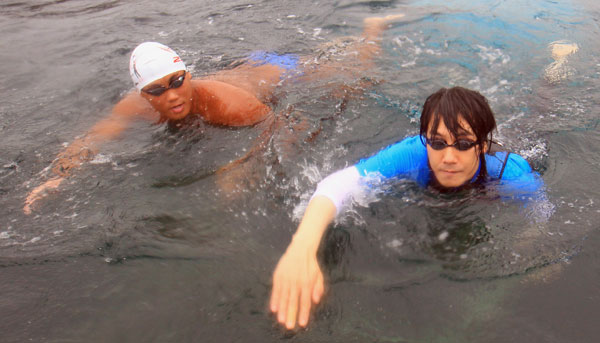ROK-Japan dispute worries US
Updated: 2012-08-14 08:11
By Zhang Yunbi (China Daily)
|
|||||||||||
Tensions between Seoul and Tokyo over the disputed islands continued on Monday, and the rift is prompting Washington to worry about the already shaky US-Japan-ROK trilateral collaboration, analysts said.
 |
|
Republic of Korea singer Kim Jang-hoon (right) and a swimming club member swim in the sea off Uljin, 225 km southeast of Seoul, on Monday. A team of ROK residents began a 230-km relay swim from an eastern port to the Dokdo Islands, in Seoul's latest assertion of its sovereignty over the outcrops claimed by Japan. Yonhap Via Agence France-Presse |
ROK President Lee Myung-bak on Monday called Japan's reaction "expected" when discussing his Aug 10 visit to the disputed islands, which Seoul calls Dokdo and Tokyo calls Takeshima.
Lee said he had planned the visit "for three years", and he said the "Japanese government chose to express 'negative attitudes' on the islands issue due to its domestic political issues", the ROK's Yonhap News Agency said.
Japanese Prime Minister Yoshihiko Noda recalled Japan's ambassador to the ROK to discuss countermeasures, and Japanese media on Monday focused on Tokyo's plan to lodge the islands case with the International Court of Justice.
Seoul on Sunday dismissed Tokyo's plan to go to the international court and said it will not respond to the request.
Joongang Ilbo, an ROK newspaper, on Monday slammed Tokyo's request as a move to "regionalize" the issue. The paper said a resolution through the international court requires the presence of both countries.
Zhang Liangui, an expert on Korean Peninsula studies at the Party School of the Communist Party of China Central Committee, said the island visit has prompted a confrontation between Seoul and Tokyo with little room for concession, yet the conflict will not last long.
The ROK has kept a small coastguard detachment on the islands since 1954 and currently they are under Seoul's control. In both Japan and the ROK there has been friction and a fluctuating nationalist mood over the islands issue in recent years.
Seoul's leading newspaper Chosun Ilbo said Lee is in desperate need of a boost to his political leverage. He is facing a slumping domestic popularity amid corruption scandals implicating his associates.
"Lee is showing toughness and political achievements to his domestic public as he is expected to finish this term as president next year," said Zhang.
The islands visit is also a "heavy blow" to the Noda cabinet and the ruling Democratic Party of Japan, which have been criticized for poor political performances and foreign policies, said Zhou Yongsheng, an expert on Japanese studies at China Foreign Affairs University.
Meanwhile, analysts said the islands issue will add complexity and division to the fragile US-Japan-ROK trilateral collaboration, which Washington has worked hard to develop in recent years.
Washington did not directly take a position on the islands issue. US State Department spokesman Patrick Ventrell told reporters on Aug 9, "We encourage good relations between both of our allies."
Former Japanese prime minister Shinzo Abe criticized Noda's cabinet for its poor performance on the islands issue. He said "other countries have seen the shaky situation of the US-Japan alliance", according to Japanese newspaper Mainichi Shimbun.
Washington's existing stance on the territorial issue has embarrassed Tokyo, and Tokyo has to face the problem on its own, Zhou said.
Yonhap said Washington is pushing forward its new defense strategy to contain China publicly and "it is not expecting its two key allies - Tokyo and Seoul - to arrive at a deadlock".
"Due to a limited defense budget, Washington needs its allies in the region to help it pivot to Asia," Zhou said.
Since the 1950s, Washington has tried to group the three countries together to beef up its military presence on the Korean Peninsula as well as in East Asia, but "the bilateral link between Seoul and Tokyo remains the weakest one among the trilateral relations", Zhang said.
In late June, the US, the ROK and Japan completed live-fire military exercises in and near the ROK. The trilateral naval drill is not new, as Japan has been an observer since 2008, yet this was the first time Japan participated as a full partner.
Political exchanges are normal between Tokyo and Seoul, yet exchanges in military affairs still face challenges, most of which stem from the ROK public's anti-Japanese mood, Zhang added.
Seoul in late June decided to delay the signing of the General Security of Military Information Agreement, its first military pact with Tokyo. The ROK foreign ministry had previously said the two countries planned to sign the accord.
Lee's governing party feared being labeled "pro-Japanese" so much that it forced his government to postpone the signing, The New York Times said.
The pact, if signed, would allow the two sides to exchange military intelligence on the Democratic People's Republic of Korea and its nuclear and missile programs.
Lee on Monday also accused Japan of turning a blind eye on Seoul's demand to resolve issues stemming from colonial rule, such as the issue of forcing Korean women into sexual slavery for Japanese troops during World War II.
zhangyunbi@chinadaily.com.cn
Related Stories
ROK leader criticizes Japan over colonial rule 2012-08-13 18:58
Japan ambassador to ROK to return 2012-08-10 16:24
ROK, US to stage annual joint military drill 2012-07-23 13:07
ROK, Japan delay signing of military pact 2012-06-29 17:14
US, ROK to talk about Korean Peninsula 2012-06-28 16:55
Today's Top News
President Xi confident in recovery from quake
H7N9 update: 104 cases, 21 deaths
Telecom workers restore links
Coal mine blast kills 18 in Jilin
Intl scholarship puts China on the map
More bird flu patients discharged
Gold loses sheen, but still a safe bet
US 'turns blind eye to human rights'
Hot Topics
Lunar probe , China growth forecasts, Emission rules get tougher, China seen through 'colored lens', International board,
Editor's Picks

|

|

|

|

|

|





